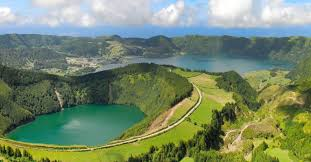Azores
Azores, an autonomous region of Portugal, are an archipelago located in the North Atlantic Ocean. Known for their stunning natural landscapes, volcanic origins, and unique biodiversity, the Azores have become a sought-after destination for travelers and nature enthusiasts. This article explores the Azores in detail, including their geography, history, culture, economy, and key attractions.
Table of Contents
Geography and Natural Features
Archipelago Composition
The Azores consist of nine main islands and several smaller islets. The main islands are:
- São Miguel: The largest and most populous island, known for its scenic beauty and the capital city, Ponta Delgada.
- Terceira: Home to the historical city of Angra do Heroísmo, a UNESCO World Heritage site.
- Pico: Known for Mount Pico, the highest peak in Portugal.
- Faial: Famous for its volcanic landscapes and the Horta marina.
- Santa Maria: The oldest island, featuring a warm climate and unique cultural heritage.
- São Jorge: Renowned for its rugged terrain and traditional cheese production.
- Graciosa: Known for its serene landscapes and geothermal features.
- Corvo: The smallest island, noted for its untouched natural environment.
- Flores: Famous for its lush vegetation, waterfalls, and scenic beauty.

Volcanic Origins
The Azores are of volcanic origin, situated on the Mid-Atlantic Ridge where the Eurasian and North American tectonic plates meet. This volcanic activity has shaped the islands’ rugged terrain, featuring volcanic craters, hot springs, and geothermal fields. Mount Pico on Pico Island, standing at 2,351 meters (7,713 feet), is the highest peak in Portugal and a prominent feature of the archipelago.
Climate
The Azores enjoy a mild, maritime climate influenced by the Gulf Stream. The weather is relatively stable throughout the year, with moderate temperatures and high humidity. Summers are generally warm, while winters are cool and rainy. The islands experience frequent cloud cover and rain, contributing to their lush green landscapes.

History
Early Settlement
The first settlers arrived from Portugal, and the islands were gradually populated with people from various regions, including the mainland and other Portuguese colonies.
Culture and Traditions
Language and People
The primary language spoken in the Azores is Portuguese, with the local dialect featuring some unique expressions and vocabulary. The population is known for its warmth and hospitality, reflecting the islands’ rich cultural heritage.
Festivals and Celebrations
The Azores are home to numerous festivals and cultural events throughout the year. Key festivals include:
- Festas de São João (June): Celebrated with music, dance, and traditional foods in various towns across the islands.
- Festas do Senhor Santo Cristo dos Milagres (May): A major religious festival in Ponta Delgada, São Miguel, honoring the Holy Christ of Miracles.
- Festas da Senhora da Graça (August): Held in Lajes das Flores, celebrating the patron saint with processions and festivities.
Gastronomy
- Cozido das Furnas: A traditional stew cooked in volcanic soil, combining meats, vegetables, and spices.
- Queijo São Jorge: A distinctive cheese from São Jorge Island, known for its strong flavor and artisanal production.
- Bacalhau: Salted codfish, a staple in Portuguese cuisine, often prepared in various ways.
Music and Arts
The Azorean musical tradition includes folk music, traditional dances, and contemporary genres. Instruments such as the viola da terra (a traditional string instrument) and the cavaquinho (a small guitar-like instrument) are commonly used in local performances. The arts, including pottery, weaving, and embroidery, reflect the islands’ cultural heritage and craftsmanship.
Economy and Development
Agriculture and Fishing
Agriculture remains a significant sector in the Azorean economy, with the cultivation of crops like tea, pineapples, and potatoes. Livestock farming, particularly dairy cattle, is also important, with São Jorge cheese being a notable product. Fishing is a traditional activity, with the waters around the Azores providing a range of seafood, including tuna, swordfish, and octopus.
Tourism
Tourism is a major economic driver for the Azores. The islands attract visitors with their natural beauty, outdoor activities, and unique experiences. Popular activities include hiking, whale watching, and exploring volcanic landscapes. Eco-tourism and sustainable travel practices are emphasized to preserve the islands’ pristine environment.
Renewable Energy
The Azores have made significant strides in renewable energy, leveraging their geothermal resources and wind power. Geothermal plants harness the island’s volcanic heat for electricity and heating, contributing to the region’s sustainability goals. Wind farms are also in operation, complementing the renewable energy mix.
Key Attractions
Natural Wonders
- Sete Cidades: A volcanic caldera on São Miguel Island, known for its twin lakes (Lagoa Verde and Lagoa Azul) and breathtaking scenery.
- Furnas: A geothermal area on São Miguel Island, featuring hot springs, fumaroles, and the famous Cozido stew.
- Lagoa das Sete Cidades: A large lake within a volcanic crater, offering stunning views and outdoor activities.
Historical Sites
- Angra do Heroísmo: A UNESCO World Heritage site on Terceira Island, featuring well-preserved colonial architecture and historical landmarks.
- Fortaleza de São João Baptista: A historic fortification on Terceira Island, providing insights into the island’s military history.
Outdoor Activities
- Whale Watching: The Azores are a prime location for whale watching, with opportunities to see species like sperm whales, blue whales, and dolphins.
- Hiking: The islands offer numerous hiking trails, including the challenging ascent of Mount Pico and scenic routes on São Jorge and Flores.
indianfastearning.comhttp://indianfastearning.com
Conclusion
The Azores are a captivating archipelago with a unique blend of natural beauty, rich history, and cultural heritage. From their volcanic landscapes and lush greenery to their vibrant festivals and local cuisine, the Azores offer a diverse range of experiences for visitors and residents alike. As a region committed to sustainable development and preservation, the Azores continue to be a remarkable destination and a testament to the enduring allure of the natural world.
www.utube.comhttp://www.utube.com







